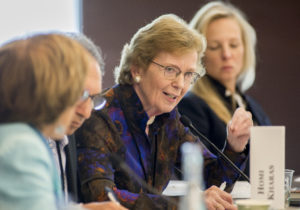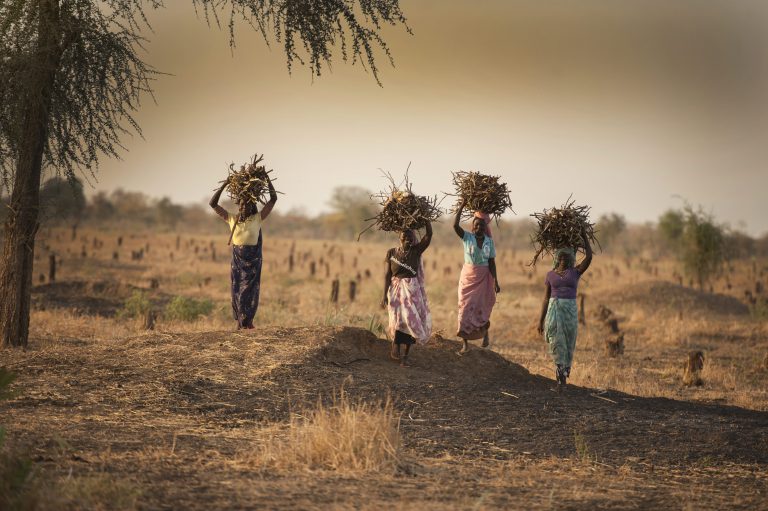Mary Robinson became one of the world’s most ardent champions for human rights after serving in the 1990’s as the first woman president of Ireland. She believes the gravest threat today to the global poor is rising temperatures caused by climate change.
“The profound injustice of climate change is that those who are most vulnerable … will suffer most,” she said shortly after Hurricanes Harvey and Irma stunned much of the Caribbean, Texas and Florida in September, and before Hurricane Maria ravaged Puerto Rico.
Now come economists from the International Monetary Fund with a report studded with world maps, bar graphs, Greek-alphabet equations and more confirming that Mary Robinson has it exactly right:
“Coping with climate change,” the report says, “is one of the fundamental challenges of the 21st century, and this challenge looms particularly large for low-income developing economies.”
The IMF advises its 189-member countries on financial risks, conducts research and advocates policies to help avoid financial crises and keep the global economy on track.
If we could wave a magic wand, the IMF suggests, poor countries’ resilience against future weather shocks would be bolstered with more hospitals and reliable electric power, more and safer roads, universal mobile telephone service, more efficient farming and health care, better banking and financing systems and coastal bulwarks to tame rising seas. They would have stable politics, and no shooting wars. (All of these are elements among the U.N.’s agenda, the 17 Sustainable Development Goals, to eliminate poverty, protect the planet and “ensure prosperity for all” by 2030.)
Yet low-income countries of course have scarce resources. Their economic progress too often is slowed if not stymied by weak governance, acutely inadequate access to health care, food, water, and education, and repression of women and girls. Many poor people are vulnerable to rising seas, wildfires, landslides, flooding or famine — and other extreme-weather events such as hurricanes, with Puerto Rico a horrific, ongoing case study.
“Adaptation to extreme weather remains very hard for poor countries,” warns Martin Wolf, Financial Times associate editor and chief economics commentator. “We have witnessed this autumn the far more damaging impact of huge storms on poorer countries, such as those in the Caribbean, than on the much wealthier U.S.”
It remains, as evidence of escalating damage from climate-change mounts, for the U.S. and other advanced economies to accelerate the flow of humanitarian aid and private-sector funds to poor countries. These resources are needed to offset increasing hardships for poor countries already caused by warming temperatures, and certain to worsen as global temperatures rise further.
Otherwise, the IMF says, the spillover into wealthier countries from more conflict, refugee crises and deadly virus outbreaks in poor countries “could be considerable.”
What can be done? What are the lessons? In his keen analysis of the 141-page IMF study issued last week, the FT’s Wolf sees six crucibles confronting policymakers in advanced countries.
- Low-income countries need to develop quickly to be better able to cope with weather shocks
- Their development needs to be consistent with mitigating the rise in global temperatures
- We need rapid improvements in the relevant technologies and their swift dissemination
- We need to help poor countries adapt to the changes in climate already sure to happen
- We need to develop insurance against weather-related shocks to poor countries
Finally, he says in echoing Mary Robinson, there is a strong moral argument for compensating poor countries for costs imposed by richer countries whose greenhouse gas emissions have fueled climate change. “The linked challenges of climate and development will shape humanity’s future,” Wolf concludes.
**
Mary Robinson has been raising alarms about climate change and human rights since her tenure as the U.N.’s High Commissioner for Human Rights at the turn of the millennium. Her 22-minute  talk at TEDWomen 2015, “Why climate change is a threat to human rights,” has been viewed more than a million times.
talk at TEDWomen 2015, “Why climate change is a threat to human rights,” has been viewed more than a million times.
Now 73, she has dedicated the rest of her life to protecting poor people from immediate and looming impacts of climate change. She also vigorously defends their rights to more energy and other resources needed to deliver economic growth and higher living standards. These are missions of her eponymous foundation, Mary Robinson Foundation-Climate Justice.
President of the organization, with headquarters at Trinity College in Dublin, this enduring world leader also was honorary co-chair of this year’s Brookings Blum Roundtable. Richard Blum is a member of her foundation’s board of advisors.
President Robinson was dismayed by the Trump administration’s rejection last June of the 2015 Paris global pact on climate change – an accord signed by 194 other nations. But she is encouraged by the many Americans – in cities, states, universities, businesses and elsewhere – who rallied to assert their commitment to fighting climate change. (See the “We Are Still In” initiative.)
“The existential threat of climate change confronts us with our global interdependence,” she said in this TEDWomen interview last month. “It cannot be seen as anything other than a global problem, and each nation must play an appropriate part to tackle it.”
** **
Top photo, courtesy of the Mary Robinson Foundation-Climate Justice, shows women gathering firewood. More than three billion people have no access to cooking fuel other than biomass. Women and children in some poor countries spend up to five hours a day gathering wood or other kindling needed for cooking fires.
Inset photo by Alex Irvin, courtesy of Brookings Institution


Leave a Reply